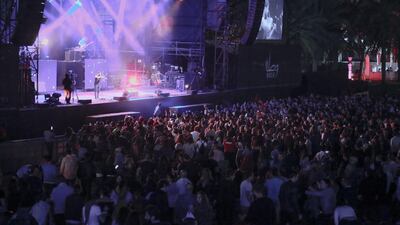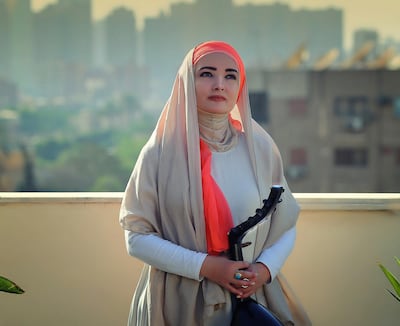If 2017 is to be remembered as the year the Arab world’s long-underground music scene went decidedly above ground in the UAE, then 2018 might prove the year we discover whether or not it was all a plucky moment of fleeting culture vogue – or if the Middle East’s greatest independent artists are ready to share the spotlight with international superstars.
Early indicators look good, with two huge festival bills taking place over the next eight days. On January 26, Abu Dhabi hosts the second edition of Cairo Sound Music Festival – now shifted from Dubai to the capital’s vast du Arena and headlined by Mohamed Hamaki, Aida el Ayoubi and Abu. While next weekend (February 2), an all-star bill of pan-Arab indie talent – topped by Cairokee, Lekhfa and Autostrad – will come together for the second Wasla festival, which has made the move to Dubai Design District (d3).
The idea of hearing such a wealth of regional talent, just a week apart, may have been unimaginable a little over a year ago: both festivals have built on the success of the inaugural editions hosted in January 2017, and this two-pronged return solidifies the UAE’s status as the natural hub for Arabic musical expression and entertainment.
And for curious ears, these events offer a dazzling burst of sonic sunlight. While mainstream Arab pop acts like Amr Diab and Nancy Ajram have been making lucrative, clockwork-like stops in the Emirates for years, evidence of the Middle East’s vibrant original “indie” music scenes – so fetishised in the western press in the aftermath of 2011’s unrest in the region – long remained largely without evidence in the UAE, a frustration exacerbated by tantalising proximity.
“It’s always been a dream of mine to witness an alternative Arabic music festival, and it’s so fitting it started in Dubai, a place where it’s very diverse, and the music is very diverse – so they match,” said iconic singer-songwriter Souad Massi, before performing at last year’s Wasla. “For me, it’s the image of the UAE.”
Firmly established as the Arab world’s 21st century business and financial hub, the role the Emirates can play in incubating the disparate strands of the region’s indie music scene is clear – offering both stability and tech alongside an affluent, cosmopolitan audience.
“This is the reason that we chose to launch Wasla in Dubai – it really is one of the few places around the world where Arabs from across the region mix and interact on such a frequent basis,” says Wasla’s marketing direct Moustafa Abdelhamid.
“This melting pot is fertile ground for a concept like Wasla to thrive and push a budding creative and independent music scene forward.”
Yet while the two festivals were also scheduled one after the other last year – at Dubai Media City Amphitheatre a week apart – they will pursue disparate paths as they move to new homes.
As if trying to make sense of this sudden sonic insurgency, in April last year Dubai hosted the inaugural Step Music, which combined a two-day industry conference alongside another festival bill at Dubai International Marine Club. Here a specialist hip-hop stage showcased another stream of the region’s bubbling streams of creativity – headliners included Iraqi-Canadian Narcy, Lebanon’s Malikah, Palestine’s Muqata’a and GCC rap duo Daffy & Flipp – while Lebanon’s Mashrou’ Leila were again called in to headline the larger rock stage, alongside compatriots The Wanton Bishops and Autostrad.
Yet this year, the future of Step Music remains unclear, with no date confirmed for a second edition.
One of the acts Step was titled “The Alternative Arabic Music Revolution”. According to the oft-told narrative, the Arab world’s independent music scene as we know it only began taking shape around the early 2000s, sparked by pioneering outfits such as Beirut’s Soapkills. Later, otherwise side-lined “underground” artists were abruptly thrust into the global media following regional unrest in 2011, when journalists developed a sudden fascination with all things Arabic, young and faintly counter-culture.
_______________
Read more:
Listen: 5 Arab female indie artists to know
Cairokee and Tania Saleh to perform the Wasla Festival
Egypt in the digital spotlight: Why musicians in Cairo and beyond are using social media
_______________
Now, with the events of Tahrir Square some six years ago, much of that western voyeurism is slipping away. Yet the impact continues to ripple closer to home, with the subsequent success and longevity of bands like Mashrou’ Leila and Cairokee proving that interesting, independent and politically charged artistry is a legitimate, if not especially lucrative, calling – inspiring a “second wave” of young indie talent.
As this regional scene gathers confidence, coherence and consistency, the UAE’s ability to position itself as an organic hub for Arabic musical expression and wider youth culture will depend on the patience of promoters as much as fickle audience demand. However, as the last chords ring out, the UAE’s cosmopolitanism may prove both a blessing and a curse.
“In Lebanon you have some great festivals which are playing to Lebanese audiences – it’s the same in Egypt – they work because they’re addressing their own culture, and not trying to get an expat audience,” said Adam Grundey, the consultant co-curator of last year’s Step Music, and formerly the editor of now-defunct Rolling Stone Middle East.
"What's happening in the UAE is festivals trying to introduce something created in a different culture into a new culture – which will take a long time, but has a lot of potential. It might take five or 10 years, but if (promoters) keep delivering good performances for that long, eventually these kinds of events will become part of the UAE's own culture."
Last January some 7,500 fans crowded together to hear offbeat Egyptian icons Cairokee, Sharmoofers and Massar Egbari at the first Cairo Sound. But with hopes of attracting more than 10,000 punters following its relocation to the capital this weekend, there has been a distinct shift towards the mainstream in music policy: boasting 13 million Facebook fans, Hamaki – who serves as a judge on MBC’s The Voice – is the very definition of a pop star, while Abu’s smooth style might be called anything but underground.
Mohamed A Mostafa, the account manager of promoters Hi Wave Events, says the second instalment of Cairo Sound is deliberately designed – in conjunction with new event partners Yas Island – to offer a broader embrace of Egyptian culture. “We realised very early the UAE is a really good place to host cultural events,” he says. “The UAE is becoming the most open, diverse place in the Arab world. Here, you have all this potential – the technology, the mix of nationalities – all the elements you need are here.”
With its move to d3, next week’s Wasla 2.0 meanwhile stays true to its tagline as an “Arab Alternative Music Festival” – even if it means calling in Cairo Sound’s headliner from last year.
Thrust into the international spotlight in the aftermath of the Egyptian unrest of 2011, with 2.6 million Facebook fans, Cairokee ranks among just a handful of independent Arabic acts guaranteed to sell tickets numbering into four figures.
Yet star power aside, Wasla is a genuine festival concept, presenting a line-up spanning an equally broad geographic breadth and sonic swathe. From Algeria’s Gnawa Diffusion – who spellbindingly blend the traditional Gnawa grooves of the Maghreb with reggae and rock – the bill arches east to Egypt, who are also represented by Lekhfa.
This fresh Arab supergroup – bringing together singer-songwriters Maryam Saleh and Maurice Louca alongside Palestinian multi-instrumentalist Tamer Abu Ghazaleh – arrive fresh from five-star reviews of their debut LP. Continuing into the Levant, Wasla’s sonic curve also makes stops at leading Lebanese singer-songwriter Tania Saleh, Jordanian indie stars Autostrad, and reaches into the Gulf thanks to Bahraini folk fusion outfit Majaz.
Organisers will be hoping to build on the success of last year's event, which welcomed 4,000 fans to hear the then-unparalleled sonic sweep of Algeria's Massi, Tunisia's Emel Mathlouthi and Mashrou' Leila. Taking place just a week after the first Cairo Sound, the fact both inaugural events were hosted at Dubai Media City Amphitheatre – one of the emirate's oldest and most-loved venues, which more ordinarily plays host to annual Western-centric blockbusters such as RedFest DXB and Dubai Jazz Festival – felt particularly pointed.
To hear so many trailblazers, eight days apart, felt like an unruly upheaval, a moment when all the crucial ingredients – artists, audience, promoters and big brand backing – had fallen briefly into step.
Cairo Sound Music Festival (www.cairosoundfestival.com) takes place at du Arena, Yas Island, on January 26. Wasla (www.facebook.com/waslamusic) takes place at Dubai Design District (d3) on February 2.


